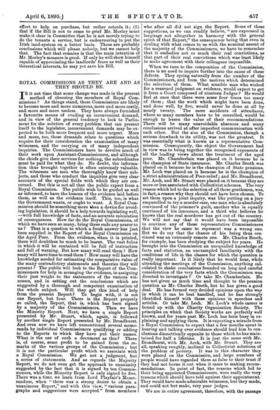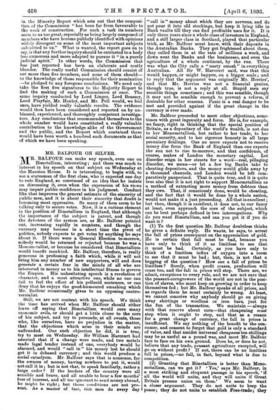ROYAL COMMISSIONS AS THEY ARE AND AS THEY SHOULD BE.
IS it not time that some change was made in the present method of choosing the members of Royal Com- missions? As things stand, these Commissions are likely to become more and more numerous, more and more costly, and more and more useless. They have always furnished a favourite means of evading an inconvenient demand, and in view of the general tendency to look to Parlia- ment for the solution of every problem that can present itself to the legislator, inconvenient demands may be ex- pected to be both more frequent and more urgent. More and more, too, these demands relate to questions which require for their consideration the examination of many witnesses, and the carrying on of many independent inquiries. The Commissioners have to devolve much of their work upon Assistant-Commissioners and although the chiefs give their services for nothing, the subordinates must be paid for what they do. No doubt, the informa- tion thus brought together is often extremely valuable. The witnesses are men who thoroughly know their sub- jects, and those who conduct the inquiries give very clear accounts of the special fields with which they are con- cerned. But this is not all that the public expect from a Royal Commission. The public wish to be guided as well as informed, to have the lessons of the evidence laid before them, as well as the evidence itself. This too, is what the Government wants, or ought to want. A Royal Com- mission should be something more than a device for avoid- ing legislation, it should be a help towards legislating well, —with full knowledge of facts, and an accurate calculation of consequences. How far do the Royal Commissions, of which we have seen so many, bring these ends any nearer to us ? That is a question to which a fresh answer has just been supplied in the Report of the Royal Commission on the Aged Poor. From the evidence, when it is printed, there will doubtless be much to be learnt. The vast folios in which it will be contained will be full of instruction and full of warning. But how many will read them ? How many will have time to read them ? How many will have the knowledge needed for estimating the comparative value of the many contradictory statements and theories they will present ? The public will look to the Report of the Com- missioners for help in arranging the evidence, in assigning their just weight to the statements of the various wit- nesses, and in setting out the conclusions which are suggested by a thorough and competent examination of the whole subject. Will they get this kind of help from the present Report ? To begin with, it is not one Report, but four. There is the Report properly so called, the Report, that is, which has been signed by a majority of the Commissioners. Then we have the Minority Report. Next, we have a single Report presented by Mr. Stuart, which, again, is followed by another single Report presented by Mr. Broadhurst. And even now we have left unmentioned several memo- randa by individual Commissioners qualifying or adding to the Reports to which they have put their names. What is the use of such a document as this ? There is, of course, some profit to be gained from the re- marks of the various groups of the Commission ; but it is not the particular profit which we associate with a Royal Commission. We get not a judgment, but a series of statements. And as regards the Majority Report, we do not even get the approach to unanimity suggested by the fact that it is signed by ten Commis- sioners, while the Minority Report is only signed by five. There was a time, we learn from Lord Playfair's Memo- randum, when "there was a strong desire to obtain a unanimous Report," and with this view, "various para- graphs and suggestions were accepted" from members who after all did not sign the Report. Some of these suggestions, as we can readily believe, 'tare expressed in language not altogether in harmony with the general spirit of that Report," the consequence being that even in dealing with what comes to us with the nominal assent of the majority of the Commissioners, we have to remember that it embodies not so much their real convictions, as that part of their real convictions which was least likely to make agreement with their colleagues impossible.
When we turn to the composition of the Commission, there is no need to inquire further into the cause of these defects. They spring naturally from the number of the Commissioners, and from the motives which determined the selection of them. What sensible man who wished for a reasoned judgment on evidence, would expect to get it from a Court composed of nineteen Judges ? He would feel at once that there were some four times too many of them ; that the work which might have been done, and done well, by five, would never be done at all by nearly twenty. The mere accidents of attendance, where so many members have to be consulted, would be enough to lessen the value of their recommendations. There will be many unavoidable absences and many conclusions arrived at after imperfect communication with each other. But the size of the Commission, though a serious drawback to its utility, was not the greatest. It was essentially what is known as a representative Com- mission. Consequently, the object the Government had in view was to bring together the recognised exponents of all the leading views about the treatment of the aged poor. Mr. Chamberlain was placed on it because he is the champion of State insurance. Mr. Charles Booth was placed on it because he is the champion of State pensions. Mr. Loch was placed on it because he is the champion of a strict administration of Poor-relief ; and Mr. Broadhurst, Mr. Arch, and Mr. Stuart were placed on it because they are more or less associated with Collectivist schemes. The very reason which led to the selection of all these gentlemen, was, in fact, a reason why they should not have been chosen. To set them upon a joint inquiry, was like putting on a jury empanelled to try a murder case, one man who is absolutely convinced of the prisoner's guilt, another who is equally convinced of his innocence, and a third who believes he knows that the real murderer has got out of the country. We will not say that it would have been impossible to convince any of these representative Commissioners that the view he came to represent was a wrong one. But we do say that the chance of his being thus con- vinced was an extremely remote one. Mr. Charles Booth, for example, has been studying the subject for years. He brought into the Commission an unequalled knowledge of facts and statistics, an unexampled familiarity with the conditions of life in the classes for which the question is really important. Is it likely that he would hear, while attending the meetings of the Commission, anything cal- culated to shake conclusions founded on long and careful consideration of the very facts which the Commission was directed to investigate ? Or take Mr. Chamberlain. He has not given as much time and thought to the pension question as Mr. Charles Booth, but he has given a good deal. He has formed very decided opinions upon the way in which it can be best handled, and he has strongly identified himself with these opinions in speeches and articles. Or take Mr. Loch. Mr. Loch's whole career is bound up with the Charity Organisation Society. The principles on which that Society works are perfectly well known, and for years past Mr. Loch has been busy in ex- plaining and applying them. It is expecting a miracle from a Royal Commission to expect that a few months spent in hearing and talking over evidence should lead him to con- clusions diametrically opposite to those which he has main- tained for half a lifetime. It is just the same with Mr. Broadhurst, with Mr. Arch, with Mr. Stuart. They are all, speaking roughly, inclined to Collectivist solutions of the problem of poverty. It was in this character they were placed on the Commission, and large numbers of people would have regarded them as false to their trust if they had not borne it out when it came to making recom- mendations. In point of fact, the reasons which led to their being appointed Commissioners, were really the very reasons which should have told against their appointment. They would have made admirable witnesses, but they made, and could not but make, very poor judges.
We are in entire agreement, therefore, with the passage in the Minority Report which sets out that the composi- tion of the Commission "has been far from favourable to the work of construction. For such a task its numbers seem to us too great, especially as being largely composed of members who have become publicly identified with opinions widely divergent on some of the most important subjects submitted to us." What is wanted, the report goes on to say, is that any further inquiry should be entrusted to a body less numerous and more adapted to pursue it "in a purely judicial spirit." In other words, the Commission that has just reported has been an elaborate and costly blunder. The really useful Commission should consist of not more than five members, and none of them should— to the knowledge of those responsible for their nomination —be pledged to any foregone conclusions. We need only take the first five signatures to the Majority Report to find the making of such a Commission at once. The same inquiry conducted by Lord Linger, Lord Brassey, Lord Playfair, Mr. Henley, and Mr. Pell would, we feel sure, have yielded really valuable results. The evidence would then have been considered and reported on by un- biassed, experienced, and thoroughly competent investiga- tors. Any conclusions that recommended themselves to the whole number would have constituted a really valuable contribution to the knowledge alike of the Government and the public, and the Report which contained them would have been worth a hundred such documents as that of which we have been speaking.







































 Previous page
Previous page